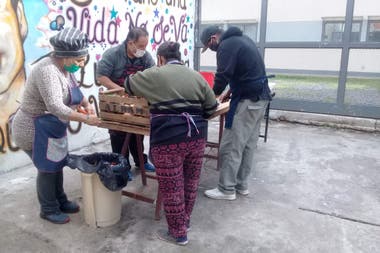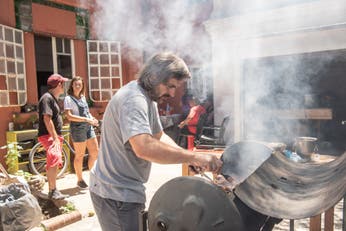For Angélica Urquiza, the Covid-19 was an invisible enemy that followed her closely, hot on her heels. In Villa 20 of Lugano, where she has lived since she was a baby, the cases grew and when, after the first symptoms, the swab tested positive, Panic gripped her. “Many families depend on this space to avoid going to bed with their bellies making noise of hunger. They cried thinking what would happen if we could not continue,” says Angélica, founder of the El Enano dining room. However, the family organization allowed that, during the month that she was isolated and with her directives at a distance, the 210 people who receive their meals daily will not remain empty-handed. It was an odyssey, but possible.
In recent weeks, small and large community spaces that provide food assistance in the city of Buenos Aires and the suburbs They went on alert for the increase in contagions by coronavirus among their referents and volunteers, which in some cases was fatal. A dramatic situation in a context where that help became indispensable. To remain open, they had to implement different strategies: from organizing small work groups to avoid that, if there is a case, all those responsible are infected at the same time; up to working 15 hours straight or asking for help from family and neighbors.
Although many of the cooks and managers are people who, due to different pathologies or their age, are among the risk groups, most decided (and could) move on. In addition, they doubled their role as spaces of awareness and containment within the neighborhoods, articulating with other organizations and municipalities to deliver basic necessities to the neighbors and information on prevention measures. But it was not easy. In addition to the uncertainty, fear of contagions and the stress of a lawsuit that skyrocketed, in several, the decrease in donations was added.
From the Food Bank of Buenos Aires, which has some 1200 beneficiary organizations, have been registering since the start of the pandemic not only the interrupted increase in demand for a plate of food-unpublished since they began working in 2002-, but also of cases of coronavirus in the territories where the dining rooms are and among its members . During June, in fact, they relieved closings of spaces temporarily or without an established reopening date.
“From the active base of organizations that we had in March, 10% had to close because they could not sustain the service for any reason, but 90% did continue it “, explains Marisa Giráldez, general director of the Food Bank of Buenos Aires. They all had to adjust their services to preventive measures, for example, distributing bags or food so that the beneficiaries eat in their houses.
Since it opened its doors, Angélica’s dining room has always focused on preparing dinner. “Four years ago, speaking to a girl in a street situation, he said to me: ‘Do you know how sad it is when you want to sleep and you are so hungry that you cannot?’ That shocked me a lot,” recalls the founder of El Dwarf, which is sustained thanks to donations and the support of organizations such as La Garganta Poderosa. “Everything is in solidarity,” summarizes the woman.

Before the pandemic, before 8:00 p.m. people stood in line with their tuppers. Currently, the volunteers receive the containers between 13 and 14 to disinfect them, at 18 they begin to fill them and from 19 to 20 families remove them. “The important thing about giving tuppers for us is that they can eat at home: that sacred moment of sharing the table is what we never wanted to break“explains Angelica, 56, who has also been working as a porter assistant in a school for almost two decades.
The germ of the canteen and of the civil association Construyendo Puentes, which Angelica created and to which she devotes all her energy, was her greatest pain. On July 8, 2009, Kiki, one of her children who was 17 at the time, went missing. “Three months later, on September 14, he was found buried as an NN in La Chacarita. He and a friend, Ezequiel, were killed by the federal police,” recalls Angélica. From that duel, La Casita de Kiki was born, a two-story cultural space with school support, gender workshops, accompaniment of trans women, among other projects. During the forties, the seven cooks of El Enano (all of them residents of the neighborhood) and their assistants organized in two groups to avoid the crowds, and other teams shared out the rest of the tasks.
When Angélica, her husband, and one of her daughters got the coronavirus, they were hospitalized and isolated for weeks. “Two of my other daughters with a friend took care of everything. The cooks, thank God, did not catch it and the dining room did not close for a day. We have many acquaintances and friends and when needed, they always give a hand,” she says. Angelica. That was not, he explains, the fate of other dining rooms in the neighborhood, which had to close. The same thing happened with some popular pots.

“I was so distressed to think that something could happen to us that I think made the illness worse. The first days I was hospitalized, panic attacks grabbed me. I thought about my neighbors, which for many is the only meal of the day, about the cooks who are single mothers and come to cook to take the food away, “says Angelica.
The dining room is open from Monday to Friday. On the weekends they give what they can to the families so that they can prepare at home. Not being able to go to the dining room for almost a month, for Angélica it was “torture”. “I was surprised how my daughters and the neighbors carried everything forward. I learned to delegate. Go, they forced me,” she concludes with a smile.
How to collaborate
- El Enano dining room (Villa 20, Lugano): They urgently need an industrial strainer for the noodles. In addition, warm clothes, footwear, blankets, sheets, food of all kinds and cleaning products. For boys and girls, cookies, milk, diapers. Contact: Angelica: 11-3648-9587
- FOL dining rooms (Villa 1-11-14, Bajo Flores): They need cleaning supplies (such as bleach and detergent) and personal hygiene items (alcohol gel, gloves, masks). In addition, lentils, chickens and food of all kinds for popular pots. Contact: Cecilia: 11-5584-7638.

- The Boys in Blue Dining Room (Villa Azul, Quilmes): They need food of all kinds in order to prepare the food they deliver to the families they attend. Contact: María: 11-2291-9166.
- Los Chicos del Arbolito civil association (Satélite neighborhood, Moreno): They need non-perishable food, vegetables, and construction materials to complete the flooding picnic area; blankets and winter clothes. Contact: Delia: 11-3483-4049. Facebook and Instagram: Civil Association Los Chicos del Arbolitos.

- Sol Naciente Civil Association (Barrio Illia, Bajo Flores): They need food, warm clothes and slippers. In addition, a membrane for the ceiling of the dining room and a hot water tank; pencils and notebooks for boys and girls. Veronica, who is a nurse, would also like to work closely with the Ministry of Health of the Nation to reach out to families in the neighborhood with prevention workshops: “My dream is to train them in health,” she says. Contact: Veronica: 11-5707-2160.
- Organized Community Dining Room (Barrio 31, Retiro): They need construction materials to be able to improve the roof of the dining room, industrial kitchen, kitchen elements and food. Contact: Franco: 11-3480-2812.

- Dining room Amigos del Padre Pepe (villa 21-24, Barracas): They need dry food so that families can eat at weekends at home. For the dining room, a freezer, refrigerator and electric oven, since the cost of gas is proving very high. Contact: Mirna: 11-5329-2077.

ALSO
.
Publicado en el diario La Nación




